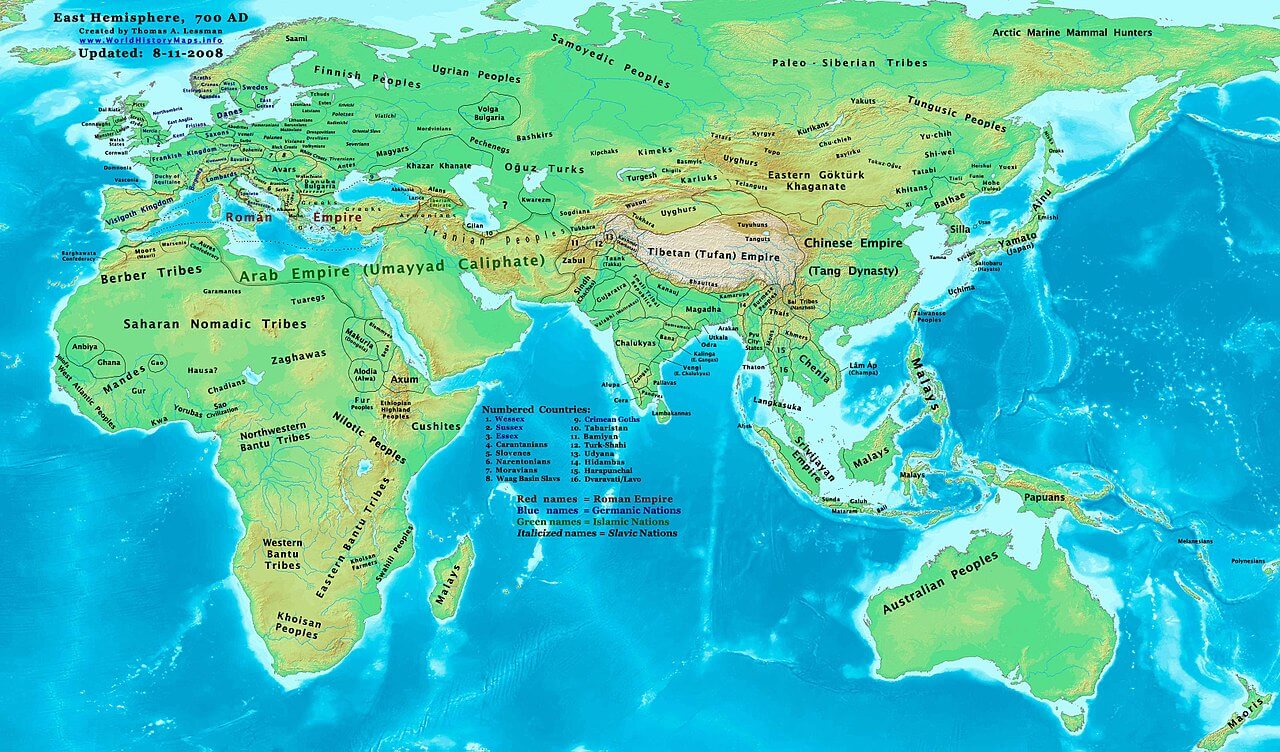What major events happened in the 8th century? What happened in 8th century BC? Eighth Century (Summary)

Source : wikipedia.org
EIGHTH CENTURY. The 8th century witnessed the rise of the Frankish kingdom as the strongest secular force in the West and the center of a new Western empire, whose Carolingian rulers entered into a working alliance with the papacy. Although the century began and ended for Europe with invasions by non-Christian peoples, during its course the Muslim advance collapsed on both the western and eastern fronts, and Christian missionary activities were extended in central Europe. Among the great men of the time, Charles Martel, St. Boniface, the Venerable Bede, and the Byzantine Emperor Leo III flourished during the first half of the century, while Charlemagne dominated the latter half.
In the world of islam, the Umayyad caliphate was displaced by the Abbasid caliphate, which built Baghdad as its capital and attained its peak of power and splendor at the end of the century under Harun al-Rashid. The civilization of T’ang China, which profoundly influenced the societies of Japan, Korea, and Vietnam, reached its last high point during the reign of Hsüan Tsung and in midcentury entered a period of military decline. India was divided among contending dynasties but managed to contain invading Arab armies, limiting their conquest to Sind. But the Arab thrust into Central Asia cut the normal land route between India and China, and from the 8th century East Asian Buddhism developed along its own lines. Southeast Asia maintained ties with both India and China.
In Africa, the southward spread of farming and ironworking peoples continued, and there were trading contacts between Black Africa and the Muslim world across the Sahara and over the Indian Ocean. In the Western Hemisphere, the 8th century was a period of creativity in the Mexican-Mayan area of civilization.
EVENTS OF THE EIGHTH CENTURY
702 — Taiho Code was promulgated in Japan, setting forth provisions for a new centralized state based on the model of T’ang China.
710 — Nara became the capital of Japan.
711 — Muslims invaded Spain.
712 — Muslims conquered Sind.
712 — Emperor Ming Huang (Hsüan Tsung) began long reign (to 756) marking a peak of cultural achievement in China under T’ang.
712 — Kojiki, oldest extant written record of Japan, was issued.
718 — Arabs lifted year’s siege of Constantinople.
726 — Byzantine Emperor Leo III (reigned 717-741) condemned veneration of icons.
731 — Venerable Bede completed Ecclesiastical History of the English Peop/e.
732 — Muslim forces were defeated by the Franks under Charles Martel near Poitiers.
750 — Abbasid caliphate (proclaimed 749) displaced Umayyad caliphate.
751 — Pepin the Short was anointed as king of the Franks.
751 — Arabs defeated Chinese at Talaş.
754 — St.Boniface, English missionary called the Apostle of Germany, was martyred.
755 — Rebellion of An Lu-shan in China began.
756 — Donation of Pepin, confirming promise (754) of lands to pope, established papal state.
756 — Abd al-Rahman restored Umayyads in Spain.
771 — Charlemagne became sole king of the Franks.
774 — Charlemagne conquered Lombard kingdom.
778 — In retreat from Spain, Charlemagne’s rear guard under Roland was annihilated.
782 — Alcuin, English scholar, became head of Charlemagne’s palace school.
780 — Tax on land replaced previous taxes, notably on individuals, as fiscal basis of Chinese government.
786 — Harun al-Rashid began reign (to 809) in which caliphate attained greatest prestige.
787 — Council of Nicaea condemned Iconoclasm.
787 — Danes began to raid England.
794 — Japanese capital was transferred to Kyoto.